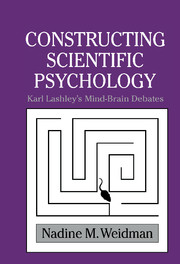Book contents
- Frontmatter
- Contents
- Preface
- Acknowledgments
- List of abbreviations
- Introduction
- 1 Lashley and Jennings: The origins of a hereditarian
- 2 Lashley, Watson, and the meaning of behaviorism
- 3 The pursuit of a neutral science
- 4 Neuropsychology and hereditarianism
- 5 Psychobiology and Progressivism
- 6 Psychobiology and its discontents: The Lashley-Herrick debate
- 7 Hull and psychology as a social science
- 8 Intelligence testing and thinking machines: The Lashley-Hull debate
- 9 Pure psychology
- 10 Public science and private life
- 11 Genetics, race biology, and depoliticization
- Epilogue: Lashley and American neuropsychology
- Appendix: Archives holding Lashley material
- Bibliography
- Index
8 - Intelligence testing and thinking machines: The Lashley-Hull debate
Published online by Cambridge University Press: 16 September 2009
- Frontmatter
- Contents
- Preface
- Acknowledgments
- List of abbreviations
- Introduction
- 1 Lashley and Jennings: The origins of a hereditarian
- 2 Lashley, Watson, and the meaning of behaviorism
- 3 The pursuit of a neutral science
- 4 Neuropsychology and hereditarianism
- 5 Psychobiology and Progressivism
- 6 Psychobiology and its discontents: The Lashley-Herrick debate
- 7 Hull and psychology as a social science
- 8 Intelligence testing and thinking machines: The Lashley-Hull debate
- 9 Pure psychology
- 10 Public science and private life
- 11 Genetics, race biology, and depoliticization
- Epilogue: Lashley and American neuropsychology
- Appendix: Archives holding Lashley material
- Bibliography
- Index
Summary
O Nature, and O soul of man! how far beyond all utterance are your linked analogies! not the smallest atom stirs or lives in matter, but has its cunning duplicate in mind.
Melville, Moby-DickIntelligence Testing and the Machine Analogy
Hull's conflict with Lashley took place on three levels. On the most obvious level, theirs was a dispute about the structure and function of the nervous system. Lashley believed the brain functioned as an equipotential system, as a whole, and that a certain amount of brain tissue was necessary, regardless of its location, for proper functioning. For Hull, the nervous system was a mosaic of discrete connections between stimulus and response, each particular connection activated by an impinging stimulus.
On a disciplinary level, they clashed about the proper relationship of psychology to the other sciences: for Lashley, psychology was completely reducible to the biology of the brain and closely connected to neurology and embryology. But Hull believed that psychology was the most basic of the social sciences and should work toward their unification, without reference to the “molecular” sciences. And on the most basic level, they were divided on the issue of the relative importance of heredity and environment in determining behavior.
- Type
- Chapter
- Information
- Constructing Scientific PsychologyKarl Lashley's Mind-Brain Debates, pp. 128 - 142Publisher: Cambridge University PressPrint publication year: 1999



